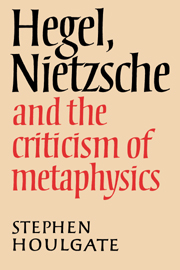Book contents
- Frontmatter
- Contents
- Preface
- Abbreviations and translations
- 1 The Hegel–Nietzsche debate
- 2 Nietzsche's view of Hegel
- 3 Nietzsche and metaphysics
- 4 Hegel and metaphysics
- 5 Speculative thought and language in Hegel's philosophy
- 6 Hegel's conception of the judgement
- 7 Context and the immanence of rationality in Hegel's Phenomenology
- 8 Hegel and Nietzsche on tragedy
- Notes
- Bibliography
- Index
8 - Hegel and Nietzsche on tragedy
Published online by Cambridge University Press: 18 November 2009
- Frontmatter
- Contents
- Preface
- Abbreviations and translations
- 1 The Hegel–Nietzsche debate
- 2 Nietzsche's view of Hegel
- 3 Nietzsche and metaphysics
- 4 Hegel and metaphysics
- 5 Speculative thought and language in Hegel's philosophy
- 6 Hegel's conception of the judgement
- 7 Context and the immanence of rationality in Hegel's Phenomenology
- 8 Hegel and Nietzsche on tragedy
- Notes
- Bibliography
- Index
Summary
Introduction
The argument of this book has tried to demonstrate two points. The first is that for all the undeniable differences that separate them temperamentally and stylistically, Hegel and Nietzsche share a common aim: to criticise the lifeless abstractions that in their view have formed too prominent a part of European religious and philosophical thinking since the Greek period, and to develop a new mode of philosophising which does justice to the multiple and dynamic quality of life. The second point is that although Nietzsche is superficially much more critical of abstraction than Hegel, he nevertheless remains caught up in the abstract oppositions which he claims to reject, whereas Hegel, for many the arch-metaphysical system-builder, is the one who subjects those oppositions to their most thoroughgoing criticism.
Nietzsche criticises traditional metaphysical concepts, particularly that of the subject or soul, by reference to the external standard of ‘life’. Metaphysical thinking, which is held to be characterised by naive faith in the truth of linguistic form, is confronted by Nietzsche with the wirklich nature of life and with the physiological conditions of its own genesis, and it is accused of obscuring or denying both. Qualities of life extrinsic to metaphysical thought – ‘before’ or ‘behind’ it, as it were – are adduced by Nietzsche in order to challenge the authority of such thought.
- Type
- Chapter
- Information
- Hegel, Nietzsche and the Criticism of Metaphysics , pp. 182 - 220Publisher: Cambridge University PressPrint publication year: 1986

